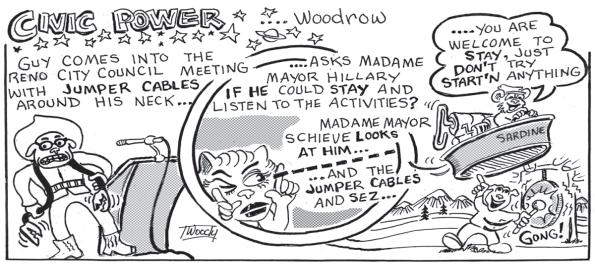
2 minute read
Advice Goddess
from April 9, 2015


Advertisement
Flee circus
My mom left when I was young, and my former husband left me, too. Maybe because of this, I’ve noticed that I’m quick to assume that any man I’m seeing is ditching me. In the early stages of dating, if there’s a lag in calling or texting me back, I’ll lash out—block the guy on Facebook and delete him from my phone—only to feel stupid when I learn that his phone battery died or he was already asleep. As a relationship progresses, I still perceive relatively innocuous things as signs it’s over, and I keep testing a guy’s limits with demands and drama. How do I stop doing this? It’s totally unconscious in the moment. British psychoanalyst John Bowlby had a theory that our “attachment style”—the way we relate in close relationships—stems from how attuned and responsive our mother was to our needs for comforting when we were infants. If your mommy was consistently there for you during your infant freakouts, you end up “securely attached,” meaning that you tend to feel that you can count on others to be there for you when you need them.
Research on adults by social psychologists Cindy Hazan and Phillip Shaver found that patterns of relating to romantic partners seem to trace back to childhood attachment experiences. But attachment history isn’t the whole story. Genes, temperament, childhood environment and other factors also shape how we relate. And though research finds that securely attached children seem likely to end up securely attached grown-ups, adult shifts in attachment style are common. In other words, just because somebody’s mommy was kind of an ice bucket, they aren’t necessarily doomed to see every boyfriend as an ice bucket with a penis.
Pledge to yourself to step back and run suspicious situations through the reason department. A technique called “cognitive reappraisal” seems to help. This involves dialing down your emotional response by changing the meaning some situation has for you. Instead of thinking “I know he’s left me!” when an hour goes by without a text back, reframe his absence in a positive light. For example, “He’s out getting me flowers.” You don’t have to know that this explanation is true. It just needs to be positive and possible. Research by psychologists Iris Mauss and James J. Gross and others finds that using this imaginative reframing not only decreases knee-jerk negative emotions but activates the prefrontal part of the brain involved in emotional control and downshifts the pounding heartbeat of stress to the thumping heartbeat of possibility.
How secure you feel can also be transformed by who you’re with. The best partner to help you shift out of auto-panic is one who is loving and caring and has a more “secure” attachment style. With some consistent work and the right guy, you could someday get to the point where absence really does make your heart grow fonder. Ω
Got a problem? Write Amy Alkon, 171 Pier Ave., No. 280, Santa Monica,CA 90405, or email AdviceAmy@aol.com (www.advicegoddess.com).













